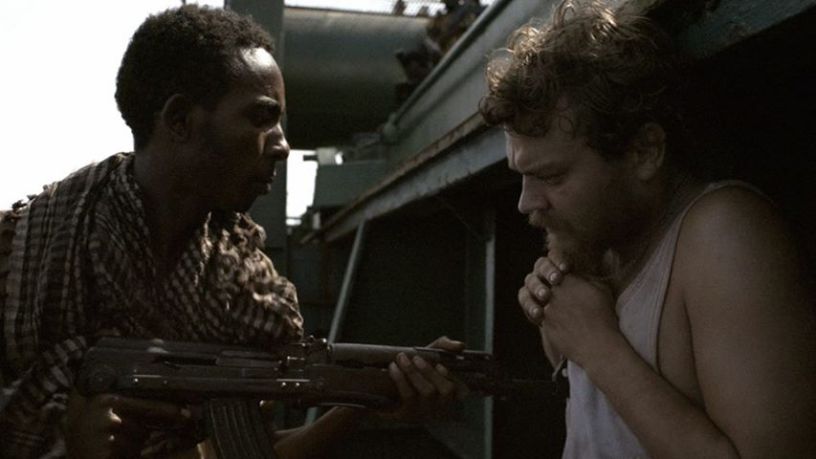A lone ship in the Indian Ocean is commandeered by hijackers. The crew struggle with their new circumstance as hostages, having to learn to interact with their captors, who in turn are focused on bargaining a good release fee for themselves. Released to the public in 2013, I am of course talking about A Hijacking. And Captain Phillips (Paul Greengrass, 2013). Released almost back-to-back with identical subject matter, comparisons between the two were inevitable, particularly with the unnecessary and pointless question “which is better?”
There are undoubtedly many similarities between the two films. Firstly, both are excellent character studies of ordinary individuals in arduous circumstances. Secondly, they are both shot on handheld cameras in documentary style (although A Hijacking does not quite have Greengrass-ian levels of shakiness). And thirdly, both are about boats in the Indian Ocean being hijacked. Obviously.
But despite the considerable overlap of subject matter, the differences between the films far outweigh their similarities. Captain Phillips’ selling points are the thrilling action sequences, the knife-edge tension, and the balance given to the motivations and backstories of both sides.
Conversely, in A Hijacking we do not see events from the hijackers’ viewpoint (save for one, Omar, who is keen to stress at all times that he is not a hijacker, but merely a translator). Instead, the plot of A Hijacking centres on the bargaining process between the hijackers and Peter Ludvigsen, CEO of the shipping company (Søren Malling), and the stresses and strains that arise from it as it endures on for days and weeks. Peter begins determined that as CEO, he should be the one leading the negotiations, directly going against advice that he should bring in a trained negotiator. As the film builds, so does the pressure on him to deliver results.
However tough Peter finds it, his situation is contrasted with that of Mikkel (Pilou Asbæk), the ship’s cook, who acts as the audience’s entry point to witnessing events on the ship. Initially understanding, as the negotiations linger on for several months, Mikkel begins to turn on his own CEO for not doing enough. The juxtasposition between the two is shown nicely in the little details of the film. For instance, Mikkel’s white vest gets sweatier and dirtier, while Peter has a nice, clean, crisp white shirt every day.
Centring the structure of the film around the bargaining process is an excellent narrative device for the drama. Characters are forced to put human lives on the table, and treat them as monetary assets. The struggle they have in doing so is a focal point for the tension.
Communication difficulties are also a central part of the tension. A crackly telephone line, with a bad delay is the only means of communication between the two sides. Similarly, conversations have to go through the aforementioned Omar, who ends up as angry and frustrated as the hijackers who are not getting what they want, and the prisoners themselves. As a result, he starts manipulating people off against each other to try to catalyse an outcome sooner. By being unable to communicate directly with each other, Peter and Mikkel do not understand each other’s positions, and the tension and anger between them cultivates.
The film’s writer/director Tobias Lindholm does a very good job, both directorially, and with the script. He had previously cut his teeth as a co-writer with Thomas Vinterberg on his outstanding film ‘The Hunt’ (2012) (not actually a biopic of the Health Secretary). On the small screen, he was also the writer on the first two series of the exceptional Danish TV drama ‘Borgen’ (2010-13).
And that is not where the Borgen links end. Clearly Denmark also has an acting pool of only a few dozen, so several people stroll straight off one set onto the next. The Prime Minister’s spin doctor is Mikkel, the TV1 News Editor becomes the CEO of the shipping company, and the leader of the Green Party is his assistant.
Of this hodgepodge of political castoffs, it is Søren Malling who gives the stand-out performance. He was excellent in Borgen in a role that developed and grew through the three series, and he is excellent again here. As the pressure mounts on him through the negotiations, we see his internal anguish forcing him to breaking point, but at no point does his performance become overblown for the sake of exaggerated drama.
It would be wrong to try and choose a ‘better’ film’ out of A Hijacking or Captain Phillips. They are both excellent, and would make an excellent double bill to provide complementary viewpoints on similar events.
Oh, and everybody should watch The Hunt.
And Borgen.
